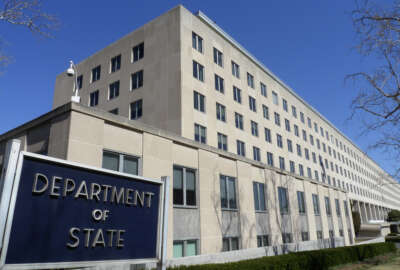World leaders left New York this week, following the conclusion of the United Nations General Assembly on Monday, the first year full in-person diplomatic talks resumed since the start of the COVID-19 pandemic.
That also means the State Department’s Diplomatic Security Service is winding down operations after deploying more than 700 personnel to protect the largest annual gathering of diplomats and heads of state.
Assistant Secretary of State for Diplomatic Security Gentry Smith, said the resumption of in-person talks with the lingering impact of COVID-19 required Diplomatic Security to deploy more personnel than it would prior to the pandemic.
“We have to be aware that one or several [employees] may be down, just because COVID has not disappeared. That had to be factored into our numbers, so that if someone goes down, we’ll have appropriate people who are still functional, who can then step into those positions,” Smith said in an interview.
The pandemic, however, allowed Diplomatic Security to bolster its technology and allow its personnel not onsite to still provide input at the command center in New York.
“We’re much more nimble now, and can be much more mobile, just because of some of the things that we’ve learned in the time of COVID,” Smith said.
General debate at the U.N. General Assembly began Tuesday, Sept. 20 and speeches continued through Monday, Sept. 26.
The General Assembly, according to the Associated Press, hosted speeches from 73 presidents — including President Joe Biden — four vice presidents — including Vice President Kamala Harris — and 49 prime ministers, as well as other high-profile dignitaries.
Biden addressed the General Assembly on Sept. 21, where he condemned Russia’s war in Ukraine, urged global action against climate change and outlined U.S. efforts to ship 620 million COVID-19 vaccine doses to 116 countries.
Secretary of State Antony Blinken on Sept. 22 also addressed the “crisis of the war” in Ukraine.
Smith said Diplomatic Security also works with the New York Police Department and its federal law enforcement partners to secure much of midtown Manhattan as part of its “360-degree operation.”
“They really know the city. And the level of professionalism is extremely helpful, as we develop and coordinate our plans,” Smith said about working with the NYPD.
Federal partners include the U.S. Marshals Service, the Bureau of Alcohol, Tobacco, Firearms and Explosives, and the Secret Service.
“While we may be focusing on routes around the city [and] what’s happening on the streets, we also have to look at what’s happening underwater, and is there anything that’s up in the air,” Smith said.
Diplomatic Security personnel on the scene include special agents who coordinate security details for protectees, and security engineering officers and security technical specialists who lay the groundwork for resilient communications.
”There’s a large group of administrative personnel who have specific capabilities that are very useful in these operations as we run a 24/7 operation, with cameras, with communications, and with a lot of technical activities backing up that operation that’s out there on the street,” Smith said.
The U.N. General Assembly is held every year just a few weeks following the anniversary of the 9/11 terrorist attacks.
Diplomatic Security personnel, in a Federal News Network oral history commemorating the 20th anniversary of 9/11, recalled how they responded to the attacks on the World Trade Center, and subsequently provided security at U.N. General Assembly.
Many diplomats arrived early that year to pay respects to police and firefighters who had fallen in the line of duty.
Smith said the interagency security apparatus for the U.N. General Assembly has evolved over the past few decades to stay on top of emerging threats.
“Communications among agencies, both local and federal, they have improved and continue to improve,” Smith said. “The coordination of activities that goes on among the multiple law enforcement entities and intelligence agencies, within the country, has matured, and it continues to improve. And each year, you can see the growth in that, for operations such as this, when things become more seamless. The means of getting information where it needs to be in a timely manner continues to be updated.”
Meanwhile, Diplomatic Security will soon begin planning for next year’s General Assembly.
“We will start planning for next year’s general assembly pretty much at the conclusion of this assembly,” Smith said. “We’re bringing in that many personnel, we want to just take care of a lot of the administrative things — where are we going to put everybody, what locations are we looking to operate from, putting together a command center type of operation so that we can have 24/7 coverage of the activities that go on.”
“We will identify a lot of those things far out, and in a few months to the beginning of the assembly, we will start assembling those pieces,” he added.
Copyright
© 2024 Federal News Network. All rights reserved. This website is not intended for users located within the European Economic Area.
